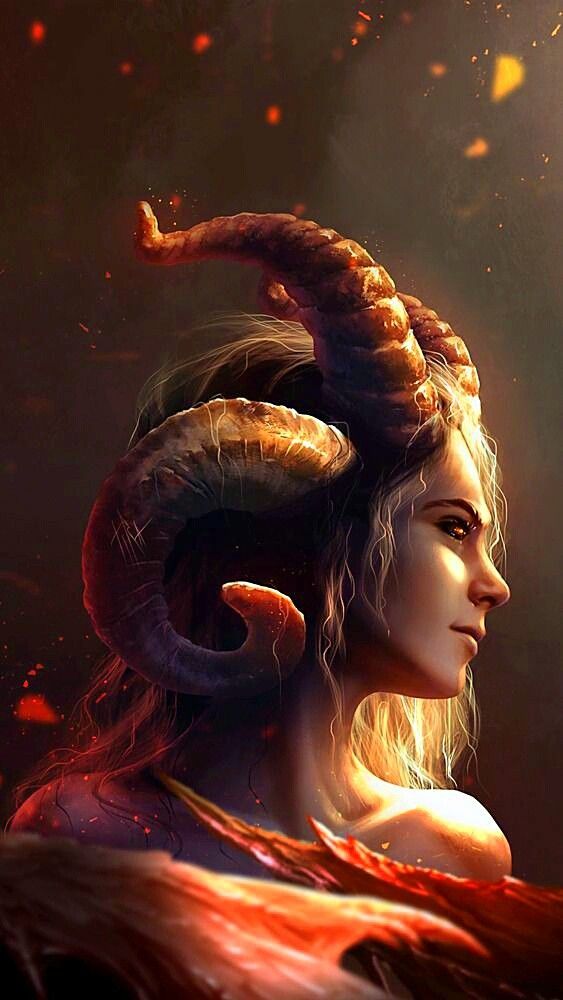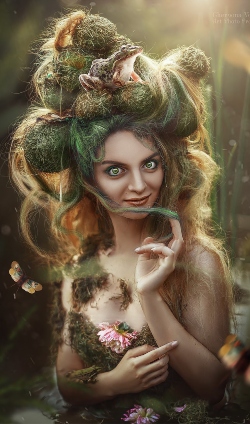Life granted by stories - stories given life
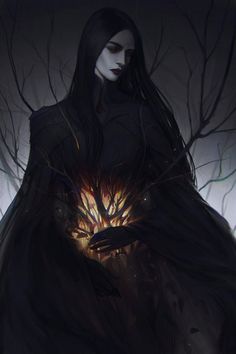
Although the vast majority of the Fae fled from the mortal world, unlike the Sidhe they have never been truly barred from returning to it. Over the intervening millennia since the departure of the Fae, the lesser Fae have been trickling back to Earth in waves. Each major upset in the Otherworld or shift in power sends a fresh wave of the Lesser Fae away from their betters and into mortal arms.
The Lesser Fae accomplish this by building a Seeming, a mortal facade and appearance which they use to mask their Fae nature and which protects them from the harsher effects of reality. Each Seeming is completely human, and only the aura of a Lesser Fae gives away its true nature. The Lesser Fae draw their life force from the dreams and stories of humanity, and in this regard they represent those stories, or archetypes within those stories.
Divides Among the Lesser Fae
While the Sidhe represent the raw power of nature and the bridled might of Danu as well as grand archetypes from tales or larger than life myths, the Lesser Fae are more humble stories, born of specific types of dreams and ideals. Each of the lesser Fae has a unique weakness that represents part of this connection, as well as a number of unique abilities that are separate from whatever castes they might have. These unique abilities reflect their origins and their purposes. The Lesser Fae refer to these divisions among their number as "Kiths" and refer to the Faerie host as "the Kithain."
Although considered to be less powerful than the Sidhe, and absolutely different than their Demifae cousins, the Lesser Fae are dangerous beings that never were human and never have been. Unlike the Sidhe, they have no bonding or symbiosis which helps anchor them to the human mindset or the mortal world. Most Lesser Fae therefore have trouble adapting initially to the mortal world.
When dealing with the Lesser Fae, legend gives hints on how to appease or placate them, and mortal magics give even more tools for dealing with the Faerie folk.
Boggans
Boggans value hard work and hospitality above all things. They also take great delight in simple earthly pleasures such as good food and drink, a warm fire, and a comfortable chair for sitting and reading. They have well-established reputations for their hard work and integrity. It is said that a Boggan is as honest as the calluses on his hands. They are also known to be busybodies. If you need to know what’s going on at court, ask a Boggan; he will almost always be up to date on the current gossip and intrigue.
Born of dreams of charity, service, and vengeance, Boggans embody all these things. Their tales originate in early stories of earthly angels who worked miracles on behalf of the poor and virtuous. Darker stories feature malicious spirits that exacted outrageous prices for services rendered. Yet others speak of small house Faeries who helped families with household chores and tended to farm animals.
Innate Weakness: Call of the Needy - Boggans are inherently helpful, and cannot resist offering aid when it is needed.
Clurichaun
The story of the leprechauns — little green-clad fairy folk hoarding gold at the end of the rainbow — comes from mortals’ distorted tales of the Clurichaun. Some kiths pity the Clurichaun, seeing them as victims of hundreds of years of bad PR, but others suspect that’s exactly how the Clurichaun want it, seeing it as a tremendous joke they’re playing. Whether in Ireland or abroad, Clurichaun share a love of music, both listening and playing. Most Clurichaun play at least one instrument and many possess the famous Irish tenor voice as well. They enjoy telling stories through song, though they’ll also spin a tale in prose. These jacks-of-all-trades are equally comfortable as bards, comedians, and oral historians, and have a certain dash of the Irish blarney. They don’t lie outright, but they do love to tell a tall tale, often embellishing the story for the sake of humor or to build excitement.

More than anything, even music, stories, and fighting, Clurichaun love their collections. Each Clurichaun has at least one item he hoards and cherishes above everything else, the basis of the mythical pot of gold. Some Clurichaun collect vinyl albums or porcelain statuettes, while others might have more expensive tastes, pursuing all the works of a particular artist or searching for rare stamps or coins. Clurichaun go to great lengths, even great personal risk in some cases, to add another item to their collection. They remember every detail of how they acquired each of their treasures, too, and gladly tell those stories to revisit the fond memories of prior adventures.
Innate Weakness: Hoard — For Clurichaun, collecting isn’t a mere hobby, but a consuming obsession. They must spend time with their collection frequently to satisfy this aspect of their nature, an easier task for a Clurichaun with a smaller, more portable collection than for one whose hoard is large or unwieldy.
Eshu
Eshu take their name from the Yoruba trickster spirit, which also served as a messenger. They first sprang into being from the dreams of the nomadic people of Chaldea, spreading across the African continent, through Mesopotamia, and into India. Eshu are the true wanderers, unable to resist the call of the open road. Their wanderlust carried them across the globe, where the naturally-adaptive Eshu adopted elements from the many cultures they encountered. Intelligent and intuitive, Eshu remember every story they hear, weaving it into a tapestry of complex oral history and a record of myths and legends from countless civilizations still living or long dead. Though curious about other cultures and their practices, Eshu guard their own secrets closely, veiling their personal lives and rituals from any outside their kith. People often believe themselves closer to an Eshu than the Eshu actually feels toward them, and are surprised to discover how little they truly know this enigmatic kith. Conversely, even the wariest troll and most taciturn Sluagh may realize — only after the fact of course — that they have inadvertently confessed their dearest secrets, only to later find them spun into tales the Eshu shares over the fire.
Gifted storytellers, singers, and performers, Eshu are well suited for lives as traveling entertainers. Because they have seen mortal history unfolding for thousands of years, many Eshu develop a fondness for tugging on a single thread of a story and following it from its beginning to the role it plays in current events. Eshu seekers often find themselves swept up in movements dedicated to social and political justice, though they don’t always stay long enough to see those movements to fruition. An Eshu can make posters in the morning, march in a protest in the afternoon, then be two cities over by dinner, sharing the story with yet another audience. In this way, Eshu actually help to spread awareness of important social issues and the techniques used to pursue justice.
Innate Weakness: Reckless - Eshu can’t resist a gamble or a dare, not if the payout is a new story for their repertoire. Their curiosity and confidence in their ability sometimes leads them to take risks that a less adventurous Fae might not take.
Nockers
Nockers are as well known for their cynicism and bitterness as they are for being master crafters. They are also fiercely individualistic and belittle anything that does not match their own ideal of artistic perfection. They prefer to create and surround themselves with treasures of mechanical wonder, rather than interact with “imperfect” people. When they are forced to have social contact they are eminently sarcastic with everyone around them and blazingly critical of anyone in charge. The bone-trembling nervousness of beginning a new project, the unbridled joy of completing the work of art, and the heart-wrenching angst of suffering through criticism — of all these things are intrinsic to the Nockers. Artists, builders, crafters, and even writers all know the torment of “knowing” that their work is not good enough, that it will never be understood. And yet, they toil on, day after day, seeking perfection that they will never find. Early legends speak of goblins and kobolds who endlessly toiled deep beneath the earth, mining, smelting and crafting, and of other diminutive beings who made toys to leave for children who were good and kind. It is from these legends that Nockers were born.
Nockers are innovators to the extreme, always seeking out the newest and edgiest feats of engineering and craftsmanship. A younger Nocker may explore many different styles and techniques before settling down and finding her niche, at which point she becomes known as an eccentric genius in her field. Sometimes other Kithain seek out such a master, hoping to learn from her artistry, but they must be strong of will to withstand the maestro’s insults and withering criticism. Nockers have developed a complex ritual of insults and disparagements that constitute greetings and familiarity. Between Nockers this is as natural as two businessmen shaking hands. For Nockers, people are a mystery. People are mercurial, have feelings that can be easily hurt, and once broken they cannot be repaired in the same way as a tool or device. Truth be told, the soul of a Nocker is as poetic as any of the Kithain. Perhaps their deepest secret is that they are, at heart, romantics. They deeply long to escape their flawed and obsessive lives and are drawn to music, art, and even courtly love, though of course, they will never admit it. Unfortunately, Nockers cannot help but treat romantic relationships like everything else and will poke and tinker until they are broken
Innate Weakness: Impossible Perfection - Nockers strive for perfection in everything they make, and yet they can never succeed. No matter how well a Nocker makes something, it always has a minor (but irreparable) flaw.
Piskies
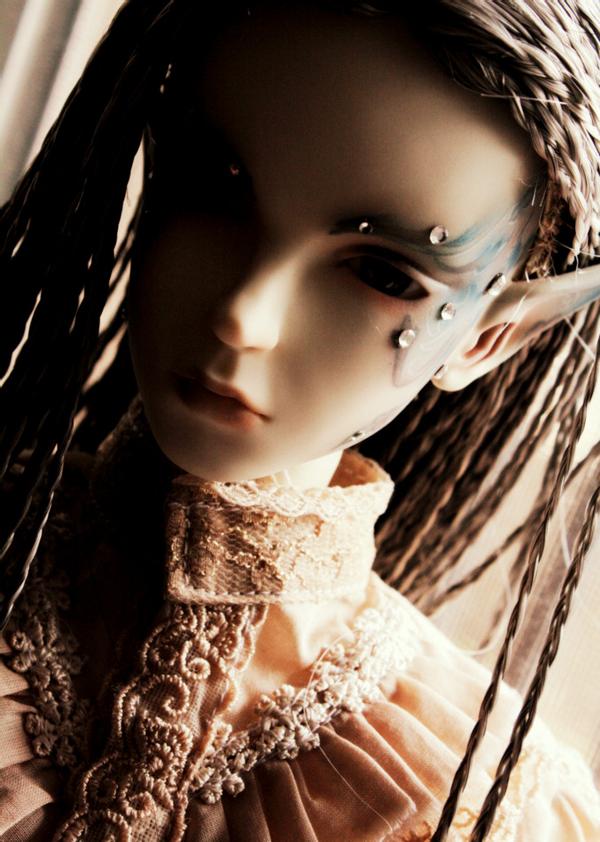
Nimble, quick, and able to blend in with any group, Piskies have a reputation among the other kiths as being friendly and attentive, but difficult to get to know well. Piskies serve as the couriers of the Fae, carrying missives, packages, and secrets back and forth between noble courts and commoners alike. They provide transportation and delivery services for hire, occasionally operating as spies for those to whom they swear fealty. Other Fae say that once a Piskey has tucked something in its pocket, be it a treasure or a secret, no one but the Piskey can ever remove it again. Piskies are a nomadic and solitary kith, usually preferring the company of mortals or other kiths to their own kind. They can integrate themselves into any migrant population, from a traveling theatre troupe to seasonal farm workers. They pick up new languages easily and enjoy exploring new cultures and traditions, fitting in quickly and effortlessly. They aren’t afraid to work hard to earn their keep, for even physical labor can be an exhilarating new experience, though few activities can hold their attention beyond a month or two. Piskies are always ready to move on to the next town, the next job, and the next face.
While most kiths share a strong sense of identity that binds them together, Piskies are seldom tied to one identity for very long. Piskies do have a natural appearance they revert to when not in the company of a group, but few people ever witness it, as the Piskey’s features subconsciously shift to those most comfortable and familiar to the viewer. The traits they do share include kindness, compassion, a willingness to listen to any story, and an uncanny knack for locating and pocketing items of value, even those which outwardly appear innocuous or worthless. Once this item makes its way into the Piskey’s pocket, she’s gone, blending into the crowd and impossible to find. Piskies love children, and go without food or warmth themselves to tend to the needs of a child. They become quite protective of their young friends, and woe to those who hurt a child who calls a Piskey their friend. Piskies always look for the best in those around them, though the Unseelie Piskey whose trust is betrayed can quickly turn bitter. Seelie Piskies, however, are more forgiving of life’s small disappointments, always hopeful that the next adventure will bring excitement and opportunities to learn and change.
Innate Weakness: Accidental Kleptomania - Piskies aren’t exactly thieves, but somehow items of great value always end up in their pockets. When a Piskey sees something she desires, she can’t help but swipe it, often without consciously making the decision to do so.
Pookas
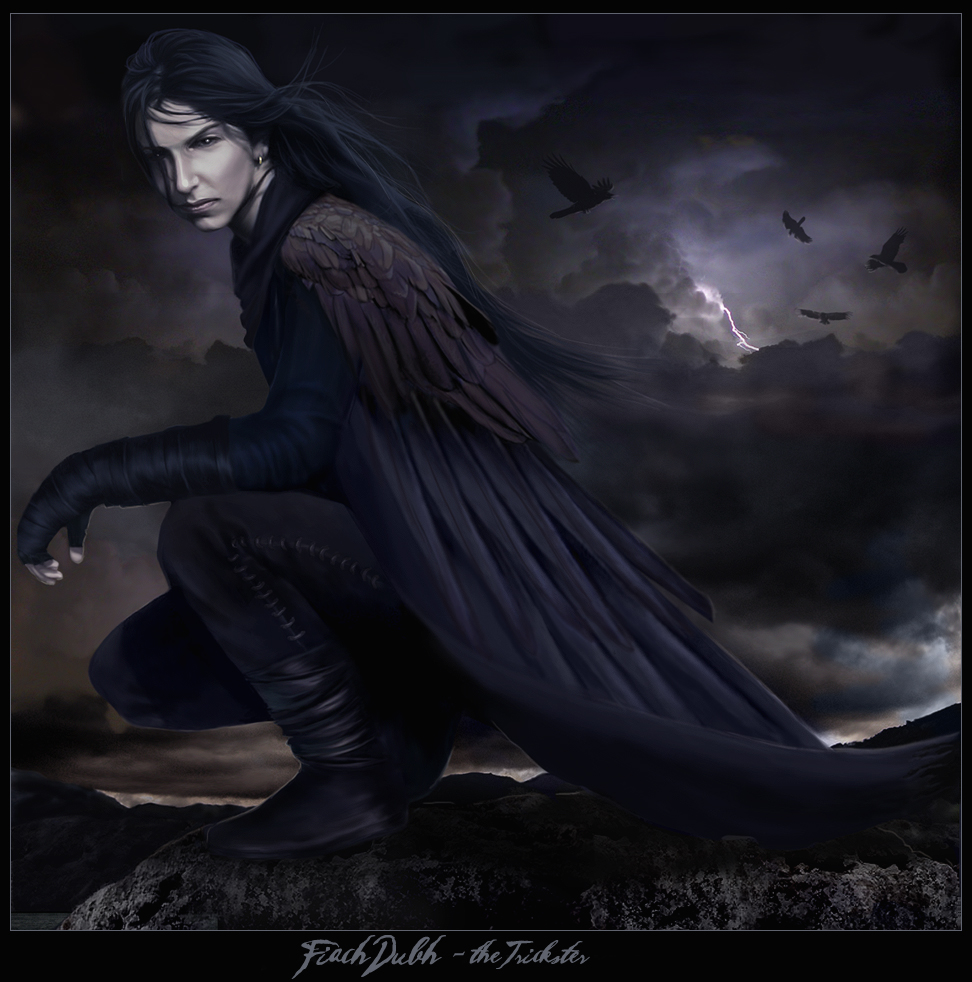
Jester, rapscallion, fool, annoying brat, ne’er-do-well, and even philosopher have all been terms used to describe Pooka. They can be among the most charming and congenial of the Kithain and, ironically, the most truthful. They wear their hearts on their sleeves; with a Pooka what you see is what you get. They love pranks and play, and they hate hard work and meanness. They play the part of the court jester, poking fun at authority figures and tearing down the walls and facades we all build to separate ourselves from one another. Most Pooka have a close bond with a particular animal, and this kinship expresses itself both physically and through the Pooka’s personality. In early tales, the Pooka was a carefree spirit who enjoyed playing minor pranks and teasing mortals. Christian dogma later changed the Pooka into a servant of the Devil — a lazy ne’er-do-well, full of lies and treachery, sometimes leading the unobservant and slow-witted to their deaths. Humans have always dreamed of a better, more carefree life. They envied the animals who could spend the day in seeming leisure, sleeping in the sun, grazing when they wished, and prancing and romping through the fields and trees, with nary a care in the world
Truth is a curious thing to Pooka. Anything they say is likely to be peppered with lies, half-truths, and misinformation. Their inability to speak the truth is well known to all Kithain. Truth, after all, is often not very exciting or happy, therefore Pooka lie. They mean no harm by it. They simply can’t help themselves. Every word a Pooka speaks is not always entirely false, and they often bury deeper truths within their deceptions. Most Pooka do not use the same method of telling falsehoods, but rather mix it up, making deciphering Pooka-ese all the more difficult. A Pooka may speak in opposites, or exaggerate, or mix in outright falsehoods to anything he says
Innate Weakness: Liar - Perhaps the greatest con the Pooka have pulled is making everyone believe that they never tell the truth. Under most circumstances a Pooka can speak the truth as long as it’s mixed with lies, half-truths, and exaggerations. The trouble comes when a Pooka is asked a direct question. A Pooka who is asked a direct question must answer with a falsehood. Answering truthfully requires an act of willpower and robs the Pooka of her powers for an hour or more depending on the type of question answered truthfully (more serious, or personal questions provoke a longer lapse in the ability to use powers).
Redcaps
Humanity and the world, mortal and Otherworld alike, is full of nightmares, but Redcaps are what Fae children fear. Named for the bright red caps they used to dip in the blood of their enemies, Redcaps long ago gave up such quaint beginnings. Instead, they embrace their heritage as the kith born out of nightmare itself to become the most terrifying, disgusting, fiercest Fae around. At their hearts, Redcaps are rebellious and headstrong, and vicious to anyone they perceive as the ruling body they must oppose. A Redcap is only happy when she is making mortal and Kithain alike recoil in terror or disgust. While a single Redcap can be a disruptive presence in any court, a group of them can become a violent tide that not even the wisest ruler can stop. Yet despite their brutal nature, Redcaps are as much a part of Fae life as any other kith. They serve as terrific fighters with a dedication to freedom and independence that makes them ferocious allies against common enemies. Those who can stand to get to know Redcaps often find that beneath that grotesque exterior beats the heart of an oft-misunderstood Redcap, simply seeking a place to belong among others like them. Still, getting beneath their exterior is difficult, and many Redcaps embrace their darker natures, becoming the shadow counterpoint to the Seelie Court’s noble warriors.
Their vicious and upstart nature keeps Redcaps out of the politics of court life, but they’re widely known for sowing dissent and unrest in the name of standing up for themselves and their kith. Only the most patient Redcaps work within the system, and often end up destabilizing things from within, just on principle. Only the strongest of Fae can keep a Redcap down, and never for very long. Eventually, a bound Redcap shakes itself free, and then the true mayhem begins.
Innate Weakness: Bad Nature - Nobody likes a Redcap, just on general principle. Whether it’s their eating habits, their issues with authority, or just their tendency for destruction, Redcaps radiate an aura of unfriendliness and barely contained violence. This aura is off-putting and most mortals don't have the stomach to endure it for long. This aura also makes sure that the Redcaps are convenient scapegoats: If something goes wrong, the Redcap is the first suspect.
Satyrs
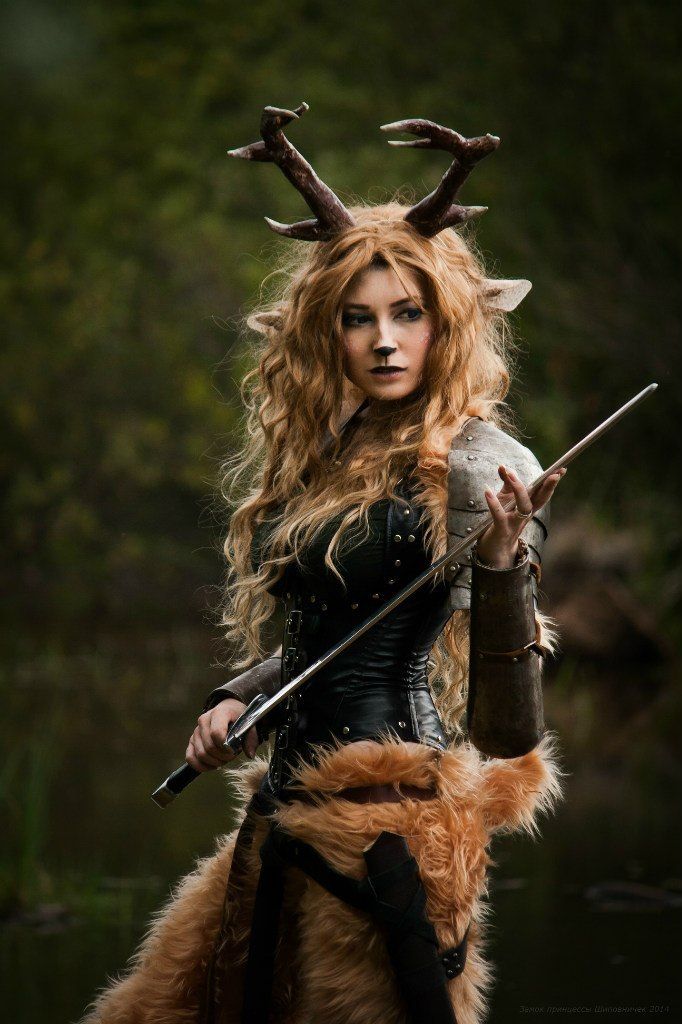
Some Fae live by the sword, some search for stories, and some spend their lives building and creating. For Satyrs, however, the truest passion in life is passion, and they devote themselves to the pursuit of pleasure. Whether they lust for food or drink, dancing and revelry, or something more carnal in nature, Satyrs pursue their desires with wild abandon. Satyrs’ appetites are tremendous, and they have the stamina to match, able to make parties, raves, or sexual encounters stretch across multiple days. They lack restraint in all things, indulge in blunt or bawdy humor at every turn, and never lack for lovers.
Satyrs charge into battle with the same fully committed passion that they devote to their revels. They throw themselves into the study of poetry, philosophy, and other academic pursuits with fervor, are both patrons and practitioners of music and art. Indulging in life’s finer pleasures doesn’t mean Satyrs are materialistic. They give gifts freely, happily sharing their possessions with others. Satyrs seldom experience romantic jealousy, believing love should also be shared. Romantic or sexual partners looking for commitment should look elsewhere; Satyrs quickly bore of relationships and want to move on to the next companion (or companions) and a new set of experiences. While Seelie Satyrs at least try to let their former partners down gently, they can’t quite understand why ending a relationship could cause so much pain. Unseelie Satyrs anticipate the inevitable end of their relationships and may exploit their partners as much as possible while they’re together while sharing passion.
Innate Weakness: Passions Folly - A Satyr’s intense passion also has a darker side. Prone to mood swings and wild fits of temper, especially while intoxicated, Satyrs may exhibit violent emotional outbursts, fall into uncontrolled weeping, or be otherwise unable to rein in their temper. Near-perpetual indulgence also means that Satyrs struggle on the rare occasion they must resist temptation.
Selkies
Selkies are both seal and human, and are creatures of contradiction, at once playful and practical, shy and outspoken, loving and distant. They fall deeply in love, spending nearly every waking minute with their beloved and then disappearing to spend long months frolicking in the sea. They may be the life of the party, talking and dancing with everyone, but they can just as quickly become secretive and reclusive. Perhaps it is their intimate connection with their seal coat, and the need to keep it safe at all costs, that causes them to keep a certain amount of distance and prevents them from ever truly trusting another. Sailors, dreams of lost loves and broken hearts, and all of those who have lost a loved one to the sea gave birth to the Selkie. The sea gives and the sea takes away. Anyone who has lived along the coast can attest to the wonders the sea gives to us: delicious seafood, beautiful shells, and the delights of swimming and sailing. But the sea is fickle, and where one day it gives us pleasure, the next it drowns a loved one or sends terrible waves that destroy homes and property. Those who truly love the sea describe an inexorable pull that pulls them back just as surely as the undertow pulls under the unwary swimmer.
A Selkie’s skin contains her Faerie essence; it is what makes her Fae. Selkies are skinchangers, except unlike Pooka or other shapeshifters such as werewolves, a Selkie must physically wear her skin in order to change form. In order to take human form again she removes her skin. If a Selkie’s skin is lost or stolen, she cannot use her Faerie magic until she regains it. If the skin is destroyed, the Selkie dies along with it though fortunately a Selkie’s skin is quite difficult to destroy. The mortal seeming of a Selkie’s skin can take many forms. Some appear to be traditional seal skins, though they can also appear to be wet suits, long coats, or any other item of apparel.
Innate Weakness: Seal Skin - A Selkie’s coat is his greatest weakness. If it is destroyed so is the Fae and the Fae is destroyed forever, beyond resurrection or recall. When a Selkie is not wearing or touching her coat she does not have access to any of her Faerie abilities.
Sluagh
Dark and mysterious, the Sluagh are little understood, and truth be told, they prefer it that way. Many call them the “underfolk,” and rumors persist of vast catacombs where they perform hideous rituals or sacrifice and carnage, but these are just wild suppositions… at least for the most part. Some do make their homes in abandoned tunnels and sewers beneath the city streets, but most Sluagh prefer crumbling Victorian mansions or ancient stone buildings. They are alternately mistrusted and feared, taunted and ignored. The Sluagh ignore the taunts and indignations and go about their business of collecting secrets and lost lore. They are by their very nature collectors, gathering things left behind and thrown away — broken toys, curious knickknacks, ancient manuscripts, worm-eaten books, and discarded correspondences are all fodder for the Sluagh’s thirst for knowledge. Outsiders are often mystified by the Sluagh’s penchant for collecting these apparently useless things, but then again, perversity is the Sluagh’s trademark. Mortals have always feared the dark and the slithery things that live beneath the earth. Perhaps the only thing humans fear more than the dark is the dead. Death and decay are reminders that we all must one day return to the soil. It is from these dreams or, perhaps more accurately, nightmares, that Sluagh are born.
While it is true that Sluagh prefer the quiet and spending time alone, some of the more adventurous Sluagh do spend time in the surface courts, usually loitering around the edges. They have also been known to cultivate friendships with other Fae and supernatural beings and even enter into oathbonds. They also go out of their way to aid or protect an outsider who shows them respect or friendship. Still, even Sluagh who find a clique they can trust needs to have a secret place to which they can retreat. Their penchant for pursing secrets often takes Sluagh to dark and mysterious places. Of the Kithain, they are among the most likely to interact with other supernatural beings, especially vampires and ghosts. They often find acceptance among these others that they cannot find among the Kithain, and much lost lore and many secrets can be learned from them.
Innate Weakness: Curse of Silence — No matter how hard they try, Sluagh cannot speak above a whisper. Even a scream only comes out as a soft sigh. They are very awkward in social situations with anyone other than other Sluagh.
Trolls

Honor. Duty. Strength. Vigilance. These are the cornerstones of the life of every Troll. Born of the dreams of warriors and guardians, trolls are the dauntless and dedicated stalwarts of the Fae courts. Honest to a fault, trolls dedicate their lives to the service and protection of other Fae. Once she takes an oath to support someone, a Troll will go to any lengths to protect her charge. That dedication is the most fundamental part of a Troll’s being, so much that if a Troll breaks that word she begins to sicken until she has redeemed herself from dishonor. Patient, chivalrous, and dependable, many see these “giants” as naive and too trusting. Yet anyone who betrays a Troll discovers the violence and rage that lurks beneath that restrained exterior.
Powerful, impressive, and handsome in their mortal forms, the bravery of Seelie Trolls is legendary. Trolls are also dedicated to chivalry and courtesy, using formal titles and following courtly rules as a matter of course. Legend says that Trolls were once the first nobles until they lost a great war to the Sidhe and bowed a knee in fealty. Now they uphold the courtly life, preferring simple living and recognition for their fidelity as reward enough for their service. Still, even the stoicism of a Troll has a limit. Trolls are stubborn and resist change, and though they are slow to anger, their tempers can explode if their honor is impugned. Push a Troll long enough, and she may begin to descend into her dark side. Trolls resist this slide into their darker nature, as Unseelie trolls, known as Ogres, are largely mistrusted and avoided by other changelings. Knowing all this is what makes other kiths look at the Trolls and their dedication to honor with admiration. In resisting their darker halves, Trolls are the bedrock of a court, staunch defenders of Fae society and its often uncertain future.
Innate Weakness: Unbreakable Word - A Troll’s integrity is as much a part of her as her strength of arms. Should a Troll break an oath or sworn contract, she begins to sicken and begins to lose her Fae powers, one every day. The only way to regain her strength and vitality is to atone for her broken promise, which can involve fulfilling a new oath or making restitution to the aggrieved party. Because of how integral a Troll’s word is to her very being, a Troll chooses her oaths — and those to whom she becomes oathbound — very carefully. Trolls who are betrayed or have a promise made to them broken have a chance to enter into a berserk frenzy, attacking the traitor or oathbreaker until restrained or the offender is slain.

